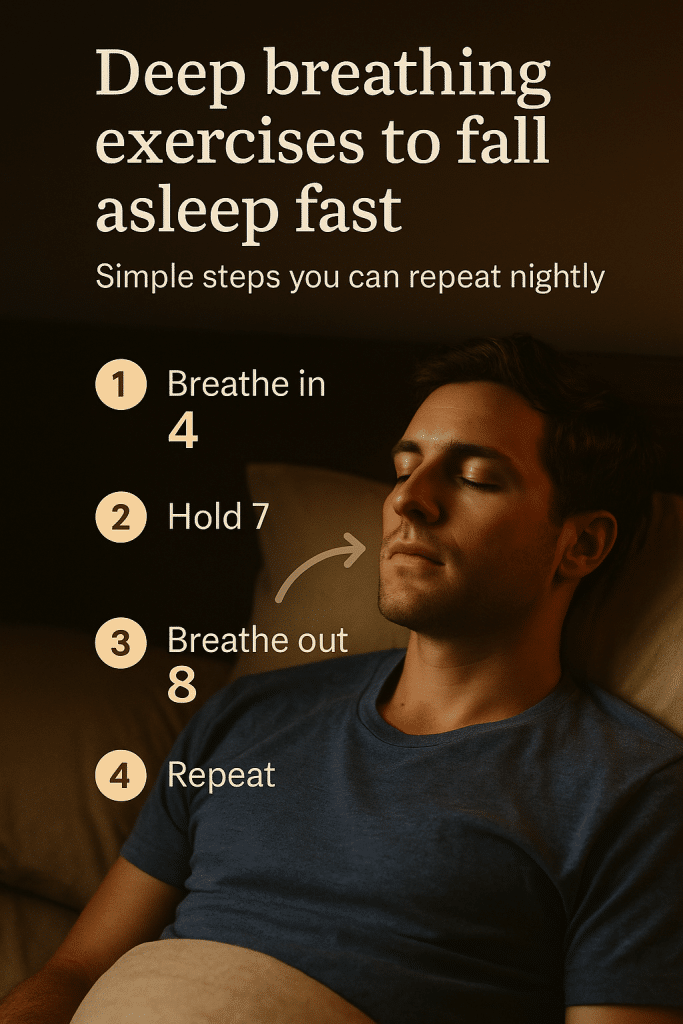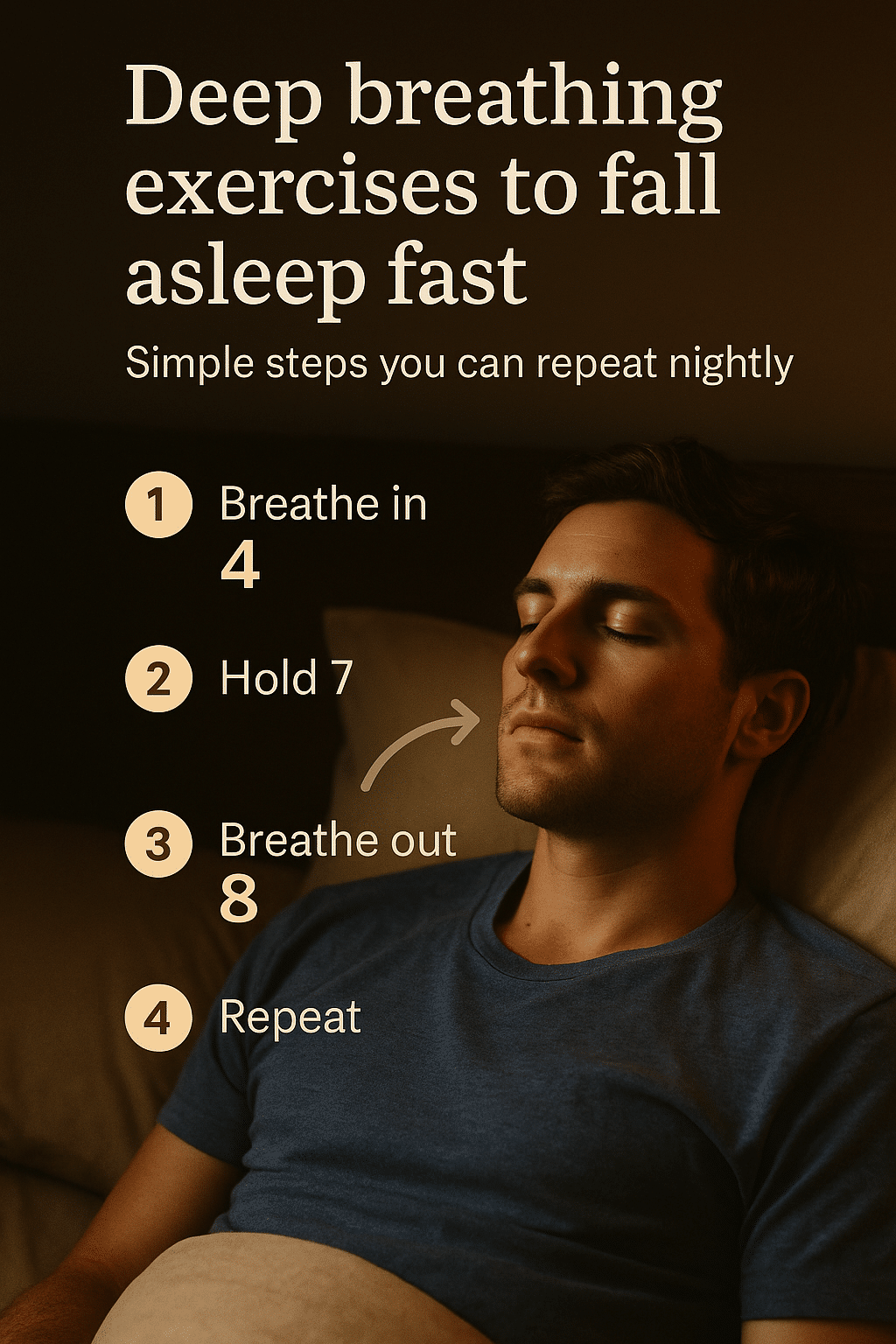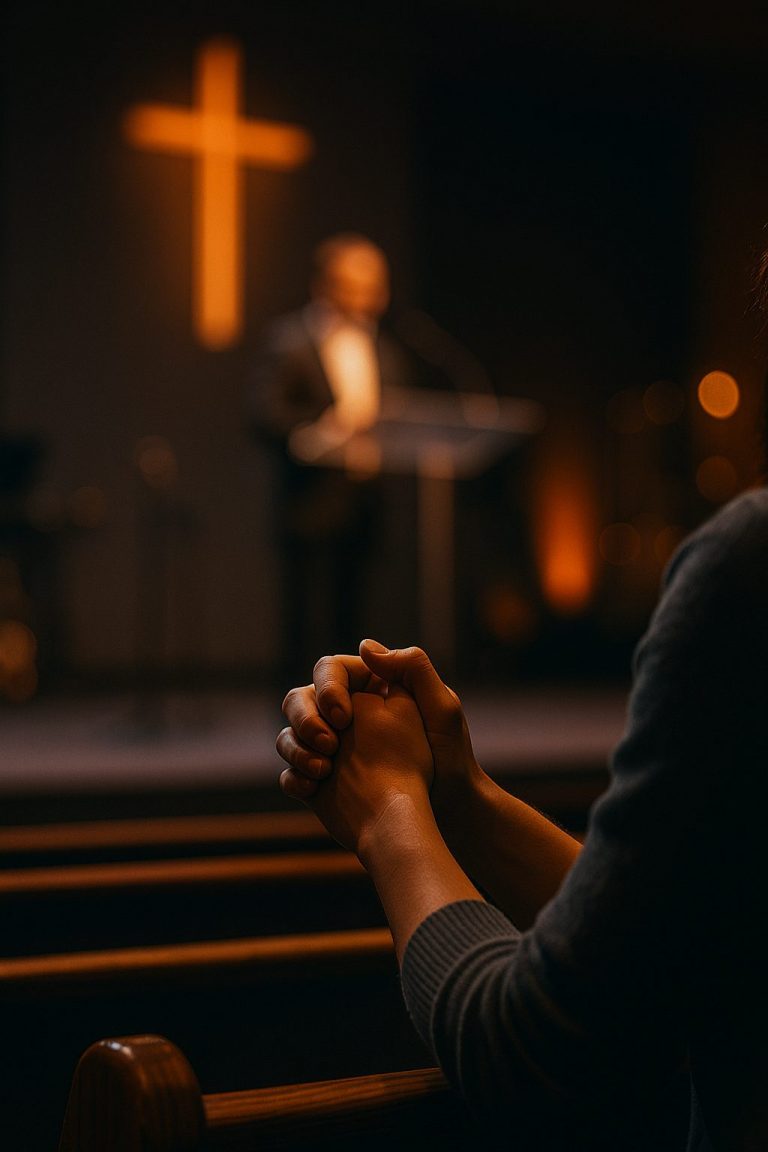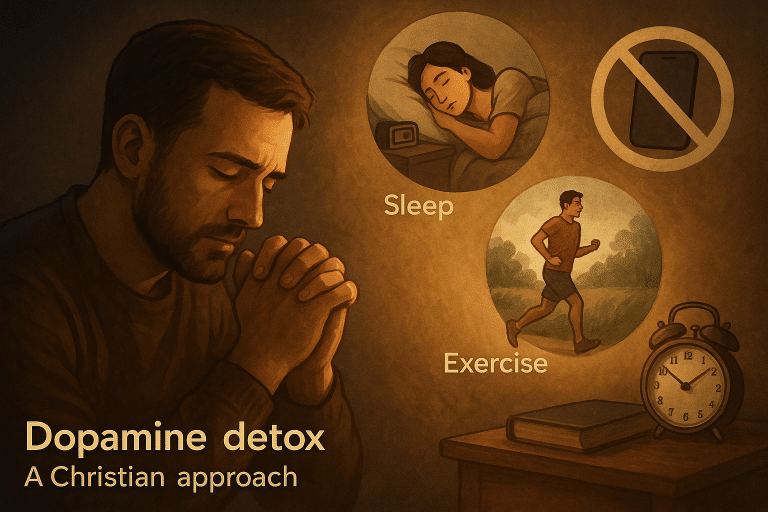Deep Breathing Exercises to Fall Asleep Fast — Guide
Estimated reading time: 7 minutes
Introduction
Sleep can feel elusive when worry hums in the background. Yet Scripture and science both invite us into a gentler night. As a practical starting point, deep breathing exercises to fall asleep fast help your body downshift while your heart learns to trust God. Insomnia often reflects a revved up nervous system, not a moral failure. Therefore, slowing the breath becomes an act of wisdom and faith. See our step‑by‑step breathing guide and meditate on Bible verses for anxiety as part of your routine.
Modern studies show that slow, diaphragmatic breathing lowers heart rate, increases heart‑rate variability, and quiets the stress response. Moreover, Christians can pair calm breathing with prayer to rest in the Lord’s care. In peace we lie down because the Shepherd keeps watch. The article draws from the attached research and clinical sources. :contentReference[oaicite:0]{index=0}
This guide offers clear cause and solution steps you can use tonight. You will learn why the body resists sleep when adrenaline is high, and how to invite the parasympathetic system to take the lead. In addition, you will practice sleep breathing techniques that fit a busy life. Finally, you will see how short prayers turn each exhale into surrender. The goal is simple: restore restful nights and joyful days.
Why Breathing Changes Sleep: Science and Scripture
Why do simple breaths create such a big change? When stress spikes, the sympathetic system keeps muscles tense and thoughts racing. However, deep breathing exercises to fall asleep fast stimulate the vagus nerve and increase parasympathetic tone. Consequently, heart rate drops, blood pressure eases, and cortisol trends down. Good sleepers naturally show this pattern at bedtime, while people with insomnia often show the opposite. For medical context, review Cleveland Clinic’s 4‑7‑8 overview and the AASM patient guide for insomnia.
Clinical evidence backs the shift. A pilot trial in Scientific Reports found that breathing at six breaths per minute before bed improved sleep efficiency and shortened the time to fall asleep. Additionally, a patient guide from the American Academy of Sleep Medicine lists relaxation training as a first‑line behavioral treatment for chronic insomnia. A controlled trial in Scientific Reports measured improved sleep when people breathed at six breaths per minute.
For a faith lens, remember Psalm 4:8: “In peace I will lie down and sleep, for You alone, Lord, make me dwell in safety.” As you breathe slowly, let that promise anchor your attention. Moreover, an even rhythm quiets rumination by giving your mind a simple count to follow. In short, deep breathing exercises to fall asleep fast provide reliable relief without side effects.
How to Practice Deep Breathing Exercises to Fall Asleep Fast
You can start in minutes. Lie on your back and place one hand on your belly. Inhale through your nose for a count of four as the hand rises. Then exhale gently for a count of six to eight and feel the belly fall. Repeat for five minutes. This diaphragmatic rhythm boosts vagal tone and signals safety. Pair the technique with short prayers for anxiety to keep attention on Christ.
Next, try the 4‑7‑8 “relaxing breath.” First exhale fully. Then inhale for four, hold for seven, and exhale for eight. Because the count is simple, you can use it when you wake at 2 a.m. and need to drift back to sleep. Box breathing also helps: inhale four, hold four, exhale four, hold four. Each pause prevents over‑breathing and steadies your pulse.
Technique: 4‑7‑8 Overview
The 4‑7‑8 pattern works as a calming breath for sleep when you need a simple anchor. Because the exhale is longest, the heart rate slows and the body releases tension.
4‑7‑8 Steps
Exhale fully. Then inhale through your nose for four. Hold for seven. Next, exhale for eight with a soft whoosh. Repeat the cycle four times and return to normal breathing.
For Christians, breath prayer turns technique into trust. For example, inhale “Abba, Father,” hold as you remember He is near, and exhale “I cast my cares on You.” Furthermore, you may also place a book on your belly to notice the rise and fall. If counting distracts you, whisper a short verse with each phase instead. Breathe gently and sleep well. For reflection exercises, explore Christian meditation for anxiety.

Healthy Habits That Amplify Your Breathing Routine (Sleep Breathing Techniques)
Healthy routines amplify the effect of deep breathing exercises to fall asleep fast. Dim lights an hour before bed and put the phone away. Blue light suppresses melatonin and keeps your brain on alert. Therefore, choose a peaceful wind‑down such as reading, journaling, or gentle stretches. Keep the bedroom cool, quiet, and dark so your nervous system does not keep scanning. For practical tips, see Sleep Foundation’s breathing techniques.
Limit late caffeine and alcohol. Heavy meals, vigorous workouts, and tense debates also push sleep away. Instead, pick small cues that tell your body it is safe: a warm shower, soft music, or a simple gratitude list. If insomnia persists for weeks despite these steps, consider Cognitive Behavioral Therapy for Insomnia. The method addresses unhelpful beliefs, schedules sleep wisely, and pairs well with breathing practice. If worry loops keep you awake, practice thought skills from how to stop overthinking.
Finally, ask for help when needed. A clinician can rule out sleep apnea or side effects from medicines. Prayerfully pursue care while trusting God to guide you. Correspondingly, He often heals through ordinary means and wise counsel.

Amazon Product Recommendations for Calming Breath for Sleep
Tools can support your routine while you practice deep breathing exercises to fall asleep fast. A dark room and steady sound reduce the triggers that wake you after you drift off. Moreover, supportive gear makes the habit easier to repeat.
Consider a contoured sleep mask that blocks stray light. Pair it with a reliable white noise machine to mask traffic or hallway noise. Many people also find that a weighted blanket lowers fidgeting by providing gentle pressure. Earplugs can help if you share a room with a snorer. Finally, a diffuser with lavender essential oil sets a relaxing cue at bedtime.
Use tools as helpers, not replacements. As you breathe slowly and pray, the products create a stable environment so your nervous system can settle. Choose comfortable fabrics that do not trap heat. Additionally, consider a pillow that supports the neck in a neutral position. In summary, small tools multiply the benefits of patient practice.
- Contoured sleep mask
- White noise machine
- Weighted blanket (cooling)
- Foam earplugs for sleeping
- Lavender essential oil diffuser
Conclusion: Slow Breathing for Insomnia
Deep rest is both gift and practice. Because God is near, you can release the day and welcome the night. As you apply deep breathing exercises to fall asleep fast, you train your body to receive that gift. Therefore, keep the routine simple, repeat it nightly, and notice small gains.
If you wake at midnight, do one minute of 4‑7‑8 and return to bed without checking a screen. If worry surges, match your inhales and exhales to a short promise: “The Lord is my shepherd.” Over time the pairing of calm breath, wise habits, and steady faith produces fewer sleepless hours and more refreshing mornings. Your role is simple faithfulness, not flawless performance. Furthermore, grace gives you freedom to practice without pressure.
Track two numbers for one month: minutes to fall asleep and number of nightly awakenings. Because change is gradual, a small downward trend still counts as success. Share progress with a friend who will encourage you and pray for you. Consequently, you build accountability and hope as the habit grows. Because you now know deep breathing exercises to fall asleep fast, you can rest in God’s care and wake restored. Breathe gently and sleep well.







